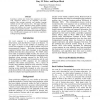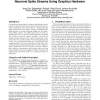66 search results - page 6 / 14 » Mining Sectorial Episodes from Event Sequences |
KDD
1998
ACM
13 years 12 months ago
1998
ACM
Learning to predict rare events from sequences of events with categorical features is an important, real-world, problem that existing statistical and machine learning methods are ...
ICDE
2009
IEEE
13 years 5 months ago
2009
IEEE
There is a huge wealth of sequence data available, for example, customer purchase histories, program execution traces, DNA, and protein sequences. Analyzing this wealth of data to ...
CF
2010
ACM
13 years 11 months ago
2010
ACM
Computational neuroscience is being revolutionized with the advent of multi-electrode arrays that provide real-time, dynamic perspectives into brain function. Mining neuronal spik...
APN
2010
Springer
13 years 5 months ago
2010
Springer
Workflow mining is the task of automatically producing a workflow model from a set of event logs recording sequences of workflow events; each sequence corresponds to a use case or ...
TKDE
2008
13 years 7 months ago
2008
Given a large spatio-temporal database of events, where each event consists of the fields event ID, time, location, and event type, mining spatio-temporal sequential patterns ident...


